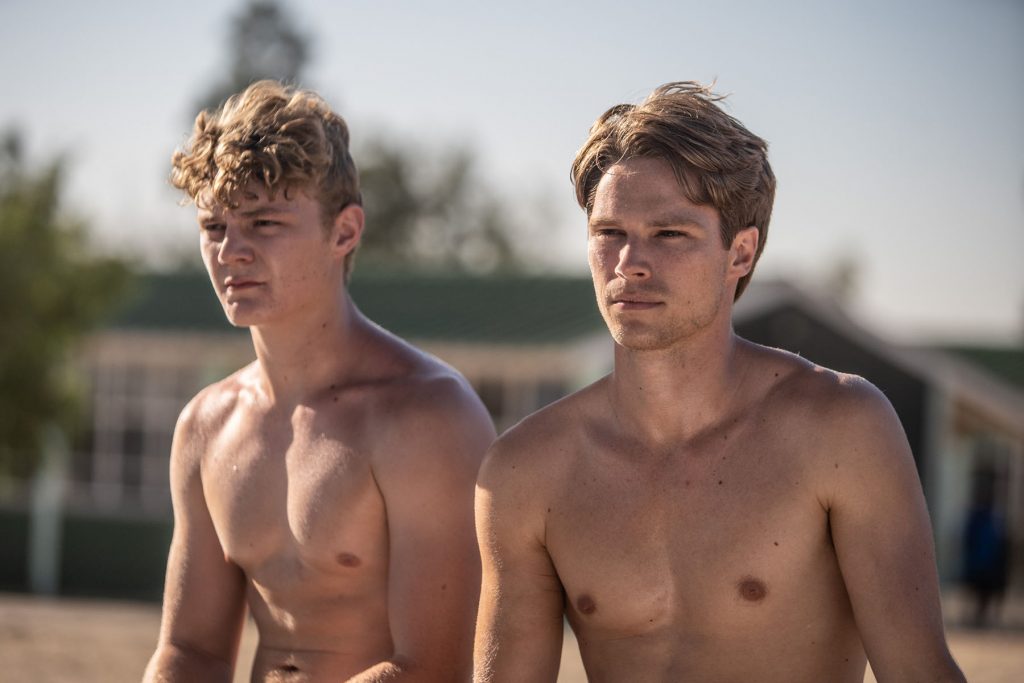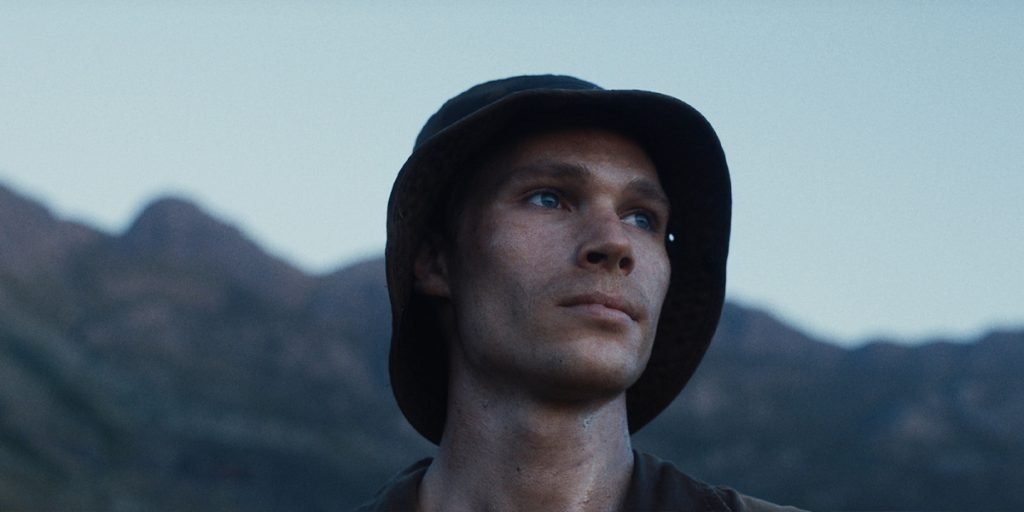Analysing racism and homophobia in 1980s South Africa, Moffie is necessarily difficult viewing and on occasion surprisingly beautiful.
Moffie was always going to be a tough watch. Based on Andre Carl van der Merwe’s autobiographical original novel, Oliver Hermanus’ film is not only set in early 1980s South Africa during apartheid, but the titular term ‘moffie’ is a derogatory Afrikaans slur for a gay person. There is a historical importance to Moffie and the story it tells, and amidst the discrimination, there are moments of beauty. But don’t be fooled by thinking Moffie predominantly shows the better side of humanity amidst its darkness; Hermanus rightly creates a film that is rough and difficult to watch, barely a whisper compared to what it must have been like to live through this dark period of history first-hand. An early tracking long shot of a train ferrying soldiers to a military camp hints at the descent into hell we as the audience are about to witness, akin to the journey into darkness experienced in Apocalypse Now (1979), and what a hellish descent it is.
The historical context in Moffie is set swiftly with some opening captions, informing the audience about apartheid in South Africa, a war against Soviet-backed and Communist Angola, and how all men of 16 years old and up were conscripted into compulsory two-year military service to fight for the racist regime. The narrative itself centres around one of these young men, Nicholas van der Swart (Kai Luke Brummer), and his time in the service. Amidst the brutal training camp, Nicholas experiences love with another soldier, Dylan Stassen (Ryan de Villiers). It is clear from the outset that homosexuality is not tolerated within South African society, shown through Nicholas’ father’s insistence on giving him a pornographic magazine with only women inside or more obviously through the constant use of homophobic slurs from soldiers and generals alike. Two other soldiers are also shown to be beaten and taken to a mental health ward upon being discovered as having a relationship.
For the most part, Moffie’s narrative is interesting. Nicholas and Dylan’s romance is a joy to behold, a glimmer of light amongst the bigotry, and the first time we see Nicholas truly smile is after their initial sexual encounter. But Moffie at times struggles to remain consistently engaging, losing its way slightly during the mid-section and adding in a flashback scene that hints at Nicholas’ homosexuality from a young age, but still feels unnecessary and tacked on.

Setting the film within the apartheid-supporting army is an interesting choice. It makes for complex viewing, as any connection to a lot of the characters through their normal behaviour is swiftly extinguished by their abhorrent racism. Even Nicholas, whose silence seems to signal disagreement with the cause and its ideals, still commits unacceptable acts later in the film that add to the complexity. Moffie can come off as feeling slightly confused on occasion: one of the generals shows his humanity late on in the film and it’s unclear whether Hermanus is trying to invoke sympathy within the audience for this racist, homophobic, brutal man. Generally, though, Moffie captures the intricacy of the audience-to-character relationships well. The setting also means there is a significant lack of black characters in the film, and when a black person is in shot, they are either ignored or abused. Hermanus always captures them from the side or from afar, intentionally stripping away their humanity and making them no more than faceless beings. As brutal as this technique is, it is understandable and effective in truly capturing the perception of black people in South Africa during this time period.
Perhaps what Moffie does most impressively is capture the hypermasculinity of military life. There’s frequent talk of sexual encounters with women, topless fighting amongst soldiers and a general machismo to their behaviour. There is a toxicity to it all, a stifling feeling which translates directly into Nicholas’ face. He is uncomfortable in his surroundings, enhanced further by his coming to terms with his own sexuality. These notions of masculinity and also of homoeroticism has perhaps never better been captured than in Claire Denis’ Beau Travail (1999), a film set in Djibouti depicting soldiers in the French Foreign Legion. Moffie has great shades of this film, in its sensual but suppressed atmosphere as well as in its portrayal of a group of men fighting for masculine pride whilst also wrestling with possible homosexuality.
And like Beau Travail, Moffie is shot handsomely. Jamie Ramsay’s cinematography captures the breathtaking beauty of the South African-Angolan border perfectly, a sparse but stunning landscape. This aesthetic translates directly into Nicholas and Dylan’s central romance, both in terms of its beauty but also in its placement amongst a dark historical context not in keeping with its splendour. Braam du Toit’s powerful score works in a similarly sparse fashion, creating a bubbling feeling of fear and danger. The romance is assuredly tragic; happiness is fleeting and often overrun by bigotry, making it all the more powerful for the audience to experience. Moffie’s subtle strength can also be its weakness, though.
The romance, as believable and cherished as it is, just feels ever-so-slightly underdeveloped. It’s a tall order to write a romance within a setting like this, where the relationship in question literally needs to be hidden from plain sight, and Hermanus and Jack Sidey’s screenplay never fully manages to find the balance. There is, simply put, not enough screentime given to Nicholas and Dylan’s relationship. Brummer’s central performance as Nicholas also falls victim, in part, to this style. His character is largely silent and reserved, which is no bad thing, but the screenplay doesn’t quite give him room to breathe and fully develop. Brummer still manages to give the role a raw vulnerability and he acutely portrays the struggles of his character, both in terms of his sexuality and his involvement with the war.
Whilst Moffie can sometimes feel too enigmatic for its own good, it still manages to be a compelling, albeit difficult, film to experience. It is not something that will demand repeat viewing, such is the darkness of its themes, but a film set in South Africa during apartheid and dealing with homophobia should never be an easy watch. The reserved, subtle style can leave some of Moffie frustratingly out of reach, but it is an experience worth giving yourself to, if you can endure it. Moffie, in its strictest sense a romantic war film, is perhaps most blatantly a horror, a film that will make your skin crawl and your soul ache with embarrassment and anger for the human race.
Moffie was released in US theaters and on demand on April 9, 2021 and is now available to watch on digital and VOD.

